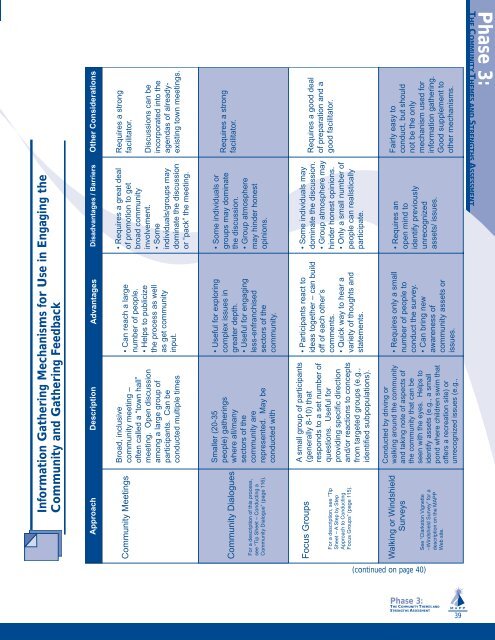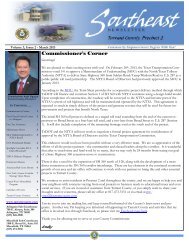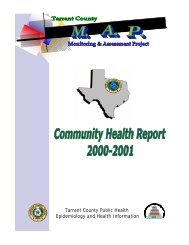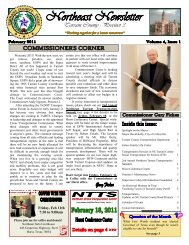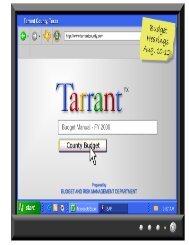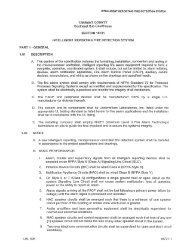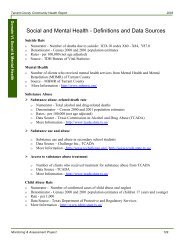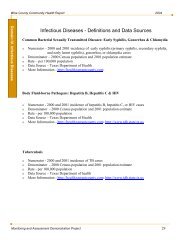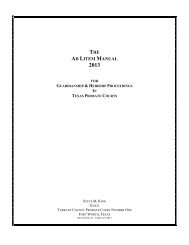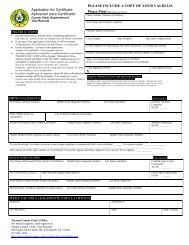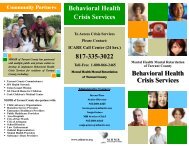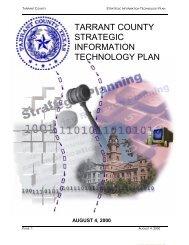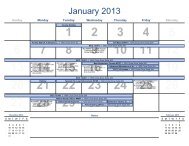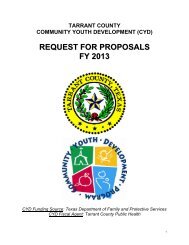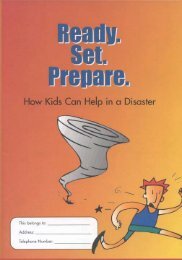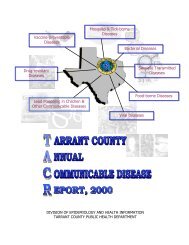MAPP Handbook - The National Association of County and City ...
MAPP Handbook - The National Association of County and City ...
MAPP Handbook - The National Association of County and City ...
Create successful ePaper yourself
Turn your PDF publications into a flip-book with our unique Google optimized e-Paper software.
Information Gathering Mechanisms for Use in Engaging the<br />
Community <strong>and</strong> Gathering Feedback<br />
Approach Description Advantages Disadvantages / Barriers Other Considerations<br />
Community Meetings<br />
Broad, inclusive<br />
community meeting –<br />
<strong>of</strong>ten called a “town hall”<br />
meeting. Open discussion<br />
among a large group <strong>of</strong><br />
participants. Can be<br />
conducted multiple times<br />
• Can reach a large<br />
number <strong>of</strong> people.<br />
• Helps to publicize<br />
the process as well<br />
as get community<br />
input.<br />
• Requires a great deal<br />
<strong>of</strong> promotion to get<br />
broad community<br />
involvement.<br />
• Some<br />
individuals/groups may<br />
dominate the discussion<br />
or “pack” the meeting.<br />
Requires a strong<br />
facilitator.<br />
Discussions can be<br />
incorporated into the<br />
agendas <strong>of</strong> alreadyexisting<br />
town meetings.<br />
Community Dialogues<br />
For a description <strong>of</strong> this process,<br />
see “Tip Sheet – Conducting a<br />
Community Dialogue” (page 116).<br />
Smaller (20-35<br />
people) gatherings<br />
where all/many<br />
sectors <strong>of</strong> the<br />
community are<br />
represented. May be<br />
conducted with<br />
• Useful for exploring<br />
complex issues in<br />
greater depth.<br />
• Useful for engaging<br />
less-enfranchised<br />
sectors <strong>of</strong> the<br />
community.<br />
• Some individuals or<br />
groups may dominate<br />
the discussion.<br />
• Group atmosphere<br />
may hinder honest<br />
opinions.<br />
Requires a strong<br />
facilitator.<br />
Focus Groups<br />
For a description, see “Tip<br />
Sheet – A Step by Step<br />
Approach to Conducting<br />
Focus Groups” (page 115).<br />
A small group <strong>of</strong> participants<br />
(generally 8-10) that<br />
responds to a set number <strong>of</strong><br />
questions. Useful for<br />
providing specific direction<br />
<strong>and</strong>/or reactions to concepts<br />
from targeted groups (e.g.,<br />
identified subpopulations).<br />
• Participants react to<br />
ideas together – can build<br />
<strong>of</strong>f <strong>of</strong> each other’s<br />
comments.<br />
• Quick way to hear a<br />
variety <strong>of</strong> thoughts <strong>and</strong><br />
statements.<br />
• Some individuals may<br />
dominate the discussion.<br />
• Group atmosphere may<br />
hinder honest opinions.<br />
• Only a small number <strong>of</strong><br />
people can realistically<br />
participate.<br />
Requires a good deal<br />
<strong>of</strong> preparation <strong>and</strong> a<br />
good facilitator.<br />
Walking or Windshield<br />
Surveys<br />
See “Clarkston Vignette<br />
–Windshield Survey” for a<br />
description on the <strong>MAPP</strong><br />
Web site.<br />
Conducted by driving or<br />
walking around the community<br />
<strong>and</strong> taking note <strong>of</strong> aspects <strong>of</strong><br />
the community that can be<br />
seen with the eyes. Helps to<br />
identify assets (e.g., a small<br />
pond where children swim that<br />
<strong>of</strong>fers a recreation site) or<br />
unrecognized issues (e.g.,<br />
• Requires only a small<br />
number <strong>of</strong> people to<br />
conduct the survey.<br />
• Can bring new<br />
awareness <strong>of</strong><br />
community assets or<br />
issues.<br />
• Requires an<br />
open mind to<br />
identify previously<br />
unrecognized<br />
assets/ issues.<br />
Fairly easy to<br />
conduct, but should<br />
not be the only<br />
mechanism used for<br />
information gathering.<br />
Good supplement to<br />
other mechanisms.<br />
Phase 3:<br />
THE COMMUNITY THEMES AND STRENGTHS ASSESSMENT<br />
(continued on page 40)<br />
Phase 3:<br />
THE COMMUNITY THEMES AND<br />
STRENGTHS ASSESSMENT<br />
39


